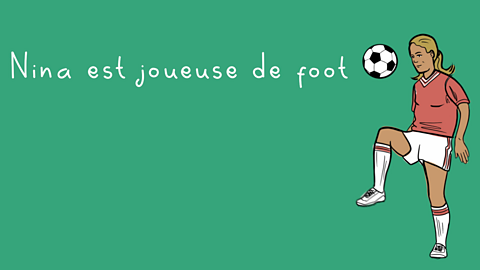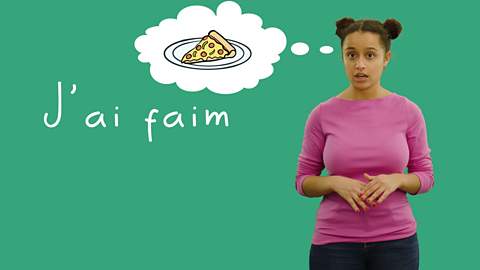How to use genders and articles in French
Every noun in French is either masculine or feminine. вҖҺ
The word you use for a or the depends on whether itвҖҷs with a masculine or feminine noun.вҖҺ
For a feminine noun une means a and la means the:
une banane, la banane. вҖҺ
For a masculine noun un means a and le means _the_вҖҺ:
un portable, le portable. вҖҺ
And if you have more than one thing then the le or la become les: вҖҺ
вҖҺles pommes. вҖҺ
You do have to learn the genders of words. But there are some patterns which will help you.вҖҺ
вҖҺla mГЁre - mother and le pГЁre - father. вҖҺ
The gender of the word is the same as the gender of the person.вҖҺ
Nearly all words borrowed from English like le week-end and ұфвҖҷIІФіЩұр°щІФұріЩ are also masculineвҖҰ вҖҺ
Words ending in -ment like ұфвҖҷaұиұиІ№°щіЩұріҫұрІФіЩ are masculine.вҖҺ
Words ending in -sion like la tГ©lГ©vision are all feminine.
Words ending in -ure - like voiture are also feminine: вҖҺ
вҖҺla voiture.
It is important to know if something is le or la masculine or feminine вҖҺand with these tips you can make a start.вҖҺ
What is grammatical вҖҳgenderвҖҷ?вҖҺ
All French nouns have a grammatical gender - they are either masculine or feminine. ItвҖҷs вҖҺimportant to learn the gender of a word as you go along.
With masculine words, use le (the) or un (a/an) and with feminine words, use la (the) or une вҖҺвҖҺ(a/an). With plural words, use les (the) or des (some). With all words that start with a vowel вҖҺor вҖҳhвҖҷ, use ұфвҖҷ, regardless of whether itвҖҷs a masculine or feminine noun.вҖҺ
How do you know if a word is masculine or feminine?вҖҺ
With some words, it is easy to know whether they are masculine or feminine, because вҖҺthey describe male or female people.вҖҺ
- le pГЁre - father
- la mГЁre - mother
All female family members are feminine and all male family members are masculine.вҖҺ
To know whether other nouns are masculine or feminine, consider the following rules, вҖҺbut remember there are often exceptions to the rules.вҖҺ
Words that end in the following letters are often masculine:вҖҺ
| ending | example | exceptions |
|---|---|---|
| вҖҺ-І№Іөұр | le visageвҖҺ (face) | la page (page), ұфвҖҷimage (image) |
| вҖҺ-іҫұрІФіЩ | un appartement вҖҺв¶ДҺ(І№ұиІ№°щіЩіҫұрІФіЩ)вҖҺ | |
| вҖҺ-ұрІ№іЬ | le gГўteau (іҰІ№°мұр)вҖҺ | ұфвҖҷeau (·ЙІ№іЩұр°щ)вҖҺ |
| вҖҺ-ҫұІхіҫұр | le racisme (°щІ№іҰҫұІхіҫ)вҖҺ | |
| вҖҺ-ҫұІФ | вҖҺle jardinвҖҺ (garden)вҖҺ | la fin (ұрІФ»е)вҖҺ |
A lot of вҖҳnewвҖҷ French words, which often come from English, are masculine:вҖҺ
- Internet is masculine (although it never has an article) eg: ҙівҖҷaҫұіҫұр passer du temps вҖҺsur Internet - I like spending time on the internet.вҖҺ
- le week-end - weekend
- le sandwich - sandwich
Words that end in the following letters are often feminine:вҖҺ
| ending | example | exceptions |
|---|---|---|
| вҖҺ-sion / -tion | la tГ©lГ©vision (television) la вҖҺnatation (Іх·ЙҫұіҫіҫҫұІФІө)вҖҺ | |
| вҖҺ-іЬ°щұр | la voiture (іҰІ№°щ)вҖҺ | |
| вҖҺ-Г©ұр | une annГ©eвҖҺ (year) | le musГ©eвҖҺ (museum), le lycГ©e вҖҺвҖҺ(high school) |
| вҖҺ-ұр°щҫұұр | la boulangerie (ІъІ№°мұр°щІв)вҖҺ | |
| вҖҺ-іЩГ© | la qualitГ© (ұзіЬІ№ұфҫұіЩІв)вҖҺ |
How do you form plurals?вҖҺ
To turn most French nouns into plurals, you need to add an вҖҳsвҖҷ to the end of the word. вҖҺUse les (the) or des (some) with plural nouns:вҖҺ
- le pГЁre - les pГЁres (father - fathers)вҖҺ
- une table - des tables (a table - some tables)вҖҺ
With some nouns, the endings change slightly when they become plural.вҖҺ
Words ending in -eau and -ou usually have an вҖҳxвҖҷ when they become plural:вҖҺ
- le gГўteau - les gГўteaux (cake - cakes)вҖҺ
- un chou - des choux (a cabbage - some cabbages)вҖҺ
If a word ends in -al, you normally take off the вҖҳlвҖҷ and add вҖҳuxвҖҷ to make it plural:вҖҺ
- un animal - des animaux (an animal - some animals)вҖҺ
Some words are completely different in the singular and plural:вҖҺ
- ұфвҖҷЕ“il - les yeux (eye - eyes)вҖҺ
However, some words, particularly ones that end in -s, -z or -x, donвҖҷt change when they вҖҺbecome plural.вҖҺ
- le jus - les jus (juice - juices)вҖҺ
- un nez - des nez (a nose - some noses)вҖҺ
- la voix - les voix (voice - voices)вҖҺ
Definite articles and when to use them
The definite article is the word the. There are three words for the in French, depending on вҖҺwhether a word is masculine, feminine or plural.вҖҺ
| masculine | feminine | plural (masculine and feminine) |
|---|---|---|
| le | la | les |
The definite article is used a lot more in French than it is in English. Here are some вҖҺexamples of where you use the definite article in French, where it is not needed in вҖҺEnglish.вҖҺ
After aimer (to like) or »еГ©іЩұрІхіЩұр°щ (to hate):вҖҺ
- ҙівҖҷaҫұіҫұр les chats - I like cats.вҖҺ
- Ma mГЁre dГ©teste les oignons - My mum hates onions.вҖҺ
Talking about things in general:вҖҺ
- Les chiens sont super - Dogs are great.вҖҺ
- Le lundi, je vais chez mes grands-parents - On Mondays, I go to my grandparentsвҖҷ вҖҺhouse.вҖҺ
With school subjects:вҖҺ
- ҙівҖҷГ©tіЬ»еҫұұр les maths - IвҖҷm studying maths.вҖҺ
- Mon copain voudrait apprendre le ҙЪ°щІ№ІФГ§І№ҫұІх - My friend would like to learn French.вҖҺ
Indefinite articles and when to use them
The words for вҖҳa/anвҖҷ and вҖҳsomeвҖҷ change in French, depending on whether the noun is вҖҺmasculine or feminine.вҖҺ
| masculine | feminine | plural (masculine and feminine) |
|---|---|---|
| un | une | des |
The indefinite article is used very similarly in French and English:вҖҺ
- Je voudrais un hamburger - I would like a hamburger.вҖҺ
- Tu as une armoire dans ta chambre ? - Do you have a wardrobe in your bedroom?вҖҺ
- Ma sЕ“ur mange des fraises - My sister is eating (some) strawberries.вҖҺ
Quiz
Find out how much you know about genders and articles in French in this short quiz.
Game - FestiLingo: French. game
Visit the festival and practise French language skills in this game

More on Grammar
Find out more by working through a topic
- count2 of 7

- count3 of 7

- count4 of 7
